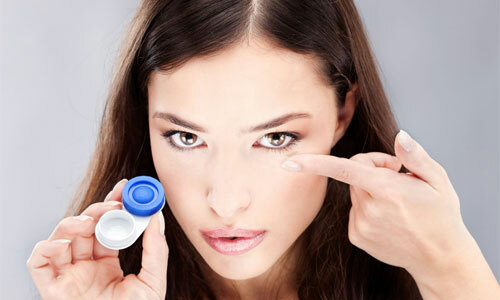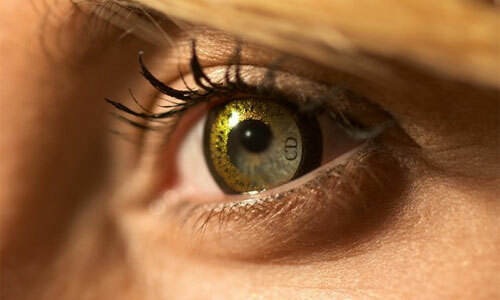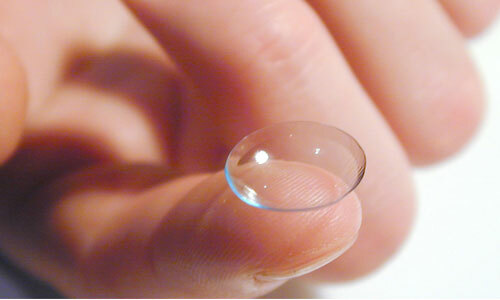Our technical age is a real test for the human eye. Computer monitors, screens of telephones and tablets exert a constant load on this important sense organ, gradually leading to a deterioration in vision.

This process can hardly be called desirable, because it is thanks to the eyes that a person receives 70% of all information. But what to do if your vision is not as perfect as before, and ophthalmologists have prescribed glasses? In this case, the most important thing is to choose the right lenses.
What lens for glasses is better to choose
Modern production technologies allow to create such glasses for glasses, which, rendering assistance to those who need correction of vision, will not harm their health. There are glass, plastic and organic spectacle lenses, each with its own advantages and disadvantages.

Glass( they are also mineral) lenses are almost not scratched, but these products are more traumatic than their plastic counterparts, as they can easily break and damage the face or cornea of the eyes with splinters. It is believed that the time of mineral lenses comes to an end, in which there is its rational grain, but there are cases when plastic loses to glass. For example, with a high degree of myopia in a patient, mineral lenses will be more relevant for him, since in this case they benefit from an aesthetic point of view.
Lenses made of plastic are resistant to falling, and light enough, however, under certain mechanical influences, small scratches may appear on them.
Organic lenses - a new word in optics. Manufactured from synthetic polymeric materials, they are light and very comfortable, they are resistant to various kinds of mechanical damage.
What are good contact lenses for the eyes
For those who do not like to go with glasses, or they simply do not go to him, there is an alternative solution - contact lenses. Correction of vision in this case is carried out in a more natural way, as the contact lens moves behind the pupil, without distorting the size and shape of the surrounding objects.
Individual lenses are very convenient, because they allow their owners to perform more active physical actions, and they are absolutely not susceptible to different weather conditions. However, many people are wary of lenses for the eyes, as there is an opinion among the people that the lenses spoil the eyesight. Is it so?
Like eyeglasses, these little assistants are really capable of worsening the health of your eyes, but only if the issue of wearing them comes carelessly. With properly selected ophthalmologist lenses, observing the established terms of their socks, the implementation of all hygiene rules, as well as with constant and correct care for them, the lenses are not capable of damaging your vision.
With all its advantages, these optical "assistants" do not suit everyone. Contact lenses can be worn for people of different ages, even children and the elderly, but on condition that they do not have the following diseases:
- conjunctivitis in chronic form;
- bronchitis or other respiratory disease;
- AIDS;
- tuberculosis;
- is an allergy of the eyes in chronic form;
- inflammation of the anterior part of the eye;
- ARVI.
There are a number of other diseases, such as strabismus and blepharitis, in which the wearing of lenses is contraindicated. In any case, before deciding to wear contact lenses, consult with a specialist!
Classification of contact lenses
After the doctor's "verdict" the next step is the search and purchase of lenses. But which lenses should I choose? It is necessary to approach this issue responsibly, having previously understood all the diversity of these optical products. All contact lenses can be divided into several groups according to certain characteristics.
For the period of use, the following are distinguished:
- one-day lenses - those that require replacement daily;
- lenses of planned replacement are those that need to be changed every two weeks, one month or three months;
- traditional contact lenses are those that are worn for 6-12 months.
The second and third have one very big advantage over the first - economic feasibility. But lenses of one-day wearing exclude the occurrence of eye infections, and delete from your list of purchases the cost of eye drops and cleansers. Among other things, one-day lenses are thinner than those designed for longer wearing, which is why they rub much less.

Depending on the wearing mode, they are divided into:
- day-wear lenses - those that are removed before going to bed;
- extended-wear lenses - those that can be worn for 2 to 30 consecutive days without removing;
- flexible lens wear - those that can sometimes be removed, and sometimes left overnight.
The day-wear lenses are good in that they allow the eyes to "recover" overnight, as during the day they received little oxygen. But their notable drawback is the need for daily removal and putting on, which are accompanied by appropriate cleaning procedures.
Extended and flexible wearing lenses require these manipulations much less often, but increase the risk of inflammation of the eyelids and eyes. In addition, they are contraindicated to people who have irregularities in the lacrimal gland or who suffer from a disease such as blepharitis. If you stop on one of the last two options, then the first week wear lenses as one-day - taking off at night and dressing in the morning.
Depending on the material used in the manufacture of lenses, they are divided into:
- rigid - made of silicone;
- soft - made of hydrogel or silicone hydrogel.
Rigid lenses are better in shape, do not crumple when blinking, they are easier to maintain and install, have better gas permeability, last longer, do not require the use of moisturizing drops. Soft hydrogel lenses poorly pass oxygen, but are most suitable for the tissues of the human eye in comparison with other lenses.
If you stayed on soft, but want to wear them for more than 20 hours a day, then it is better to buy lenses from silicone hydrogel. They are easy to dress and take off, have good throughput( though lower than hard ones), have a long wearing time, can be used at any time of the day.

On purpose it is possible to allocate:
- optical lenses;
- therapeutic lenses;
- cosmetic lens.
The former serve to correct various optical visual impairments, such as myopia, astigmatism, presbyopia, etc. They can be transparent, toned and even colored, which allows you to change the tone of your eyes. Therapeutic( or therapeutic) lenses are mainly used to protect the cornea, accelerate the healing of its epithelium, and also to improve the absorption of drugs into its surface.
Cosmetic lenses help to visually change the tone, color, and sometimes the appearance of the cornea of the eyes. Color lenses can not be worn daily, since they have a large diameter and can swim over the pupillary zone, thereby significantly impairing your vision. In addition, colored lenses are slightly thicker than usual, and can be lightly rubbed.
To summarize, you can draw the following conclusion: the choice of lenses - it is purely individual and will depend entirely on your requirements and wishes. There is only one general rule: consult a doctor, stick to all the rules for using lenses, and your eyes will be really grateful for that.
